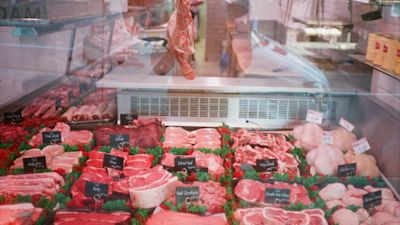UK meat producers sending carcasses to EU for butchering amid worker shortage

British meat processors are exporting animal carcasses to the EU for butchering and importing them back to the UK amid the labour shortage crisis.
Producers have begun sending beef carcasses meant for domestic consumption to Ireland for butchering and packaging, while others are looking into sending pig carcasses to the Netherlands, said the British Meat Processors Association (BMPA).
Chief Executive of the BMPA, Nick Allen, said the British industry is about 10,000-12,000 butchers short and in order to plug the gap, meat processors are having to outsource help as pigs remain stuck on farms or are culled.
But he admitted the process came at great cost, that will "sooner or later" hit consumers.
When asked if this was "mad" by BBC Radio 4's Farming Today, he replied: "Yes. But we've got this shortage of butchers, we can't source them at our home here - we've got a supply chain we want to keep running."
Meat processors are forking out an extra £1,500 per lorry to send it abroad with the carcasses, he added.
He said: "Sooner or later, all these extra costs are going to get passed down to consumers... Where else can they go?"
Mr Allen said other countries, such as Ireland, have been able to source butchers from across the world and offer them visas to work in the country.
It is therefore "logical", he said, for the UK to make use of the butchers abroad, particularly when the UK's temporary visas for foreign seasonal workers are still being processed.
Last month, the government announced a post-Brexit immigration rule U-turn, extending the temporary visa scheme to 800 butchers in a bid to prevent the culling of more than 10,000 pigs.
Farmers have already been forced to cull thousands of healthy pigs on farms - meaning they are not allowed to be used for food - because of a lack of a butchers at UK slaughterhouses.
According to Mr Allen, the visa scheme is "making good progress" and he expects to see some workers arrive by the end of the month - but he admitted that the 800 labourers, who will have to go home after six months, will not solve the long-term issue.
One pig farmer of 50 years previously told ITV News he has had to slaughter more than 100 sows because producing pigs is now costing, rather than making him money due to the worker shortage.
Suffolk-based Peter Mortimer said it is a "really hard pill to swallow" that his most recent litter will likely be his last, while another farmer said she has "sleepless nights" and can see the "anguish" on plenty of other farmers' faces.
Sophie Hope, based in Gloucestershire, told ITV News: "They have thousands of pigs backed up on farms and if their businesses suffer then ultimately mine will because we'll end up without a British pig industry at all."
Mr Allen's comments came after Farming Day at COP26 in Glasgow on Wednesday, when unions urged more needed to be done to protect biodiversity and invest in sustainable food production - particularly amid a shortage of workers.
Though not much policy has emerged in tackling greenhouse gases emitted by agriculture thus far, the UK signed up to the global pledge to reduce methane emissions by 30% by 2030.
Methane comes from many sources including agriculture - mainly livestock, as cows produce methane in their stomachs while processing food and belch it out into the atmosphere.